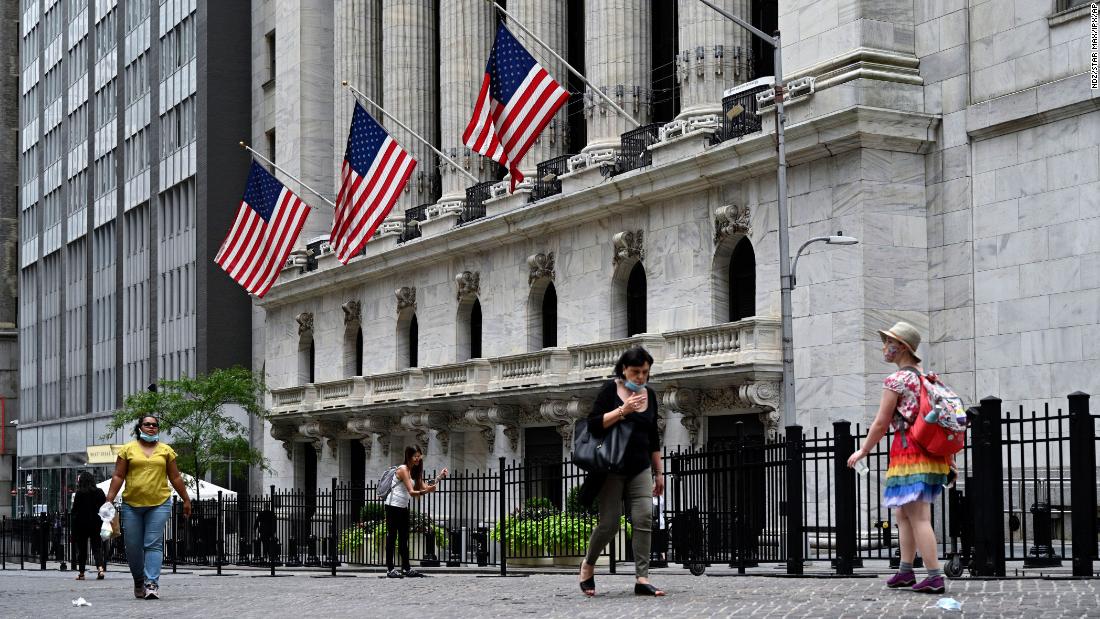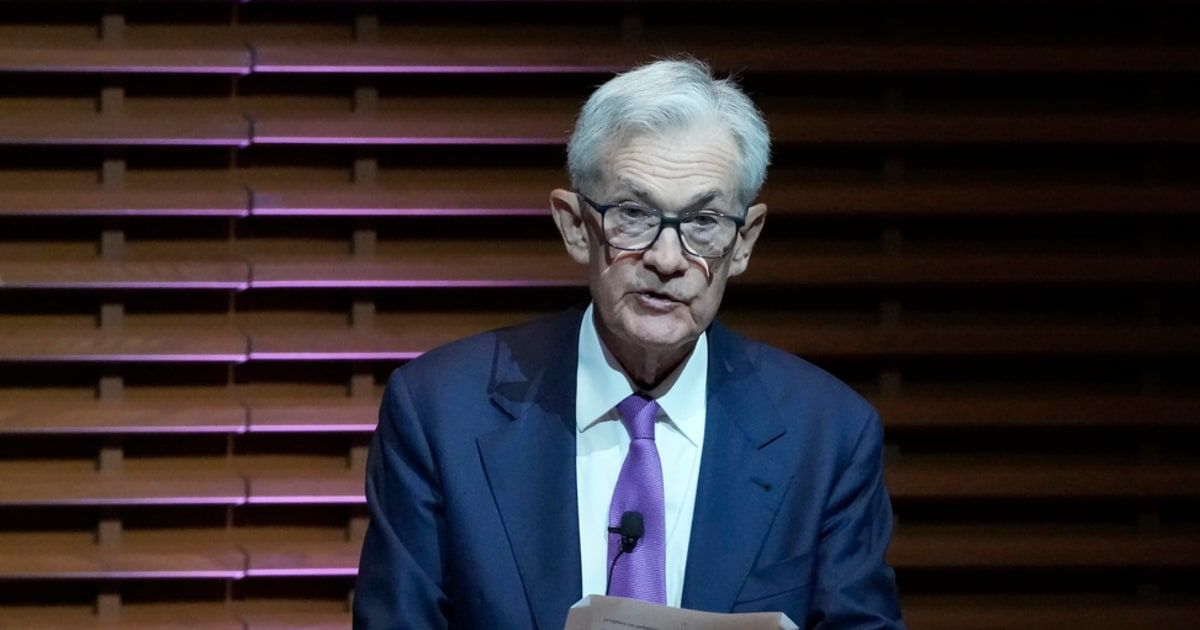US reports less inflation in August 0:50
London (CNN Business) -
If you mention the word "stagflation" to a person who followed the economy in the 1970s, you can expect a severe reaction.
The phenomenon, which refers to a period of high inflation coupled with stagnant economic growth, was a nightmare for lawmakers at the time, leaving them with few options to curb skyrocketing prices without damaging the economy.
Federal Reserve Chairman Paul Volcker was ultimately forced to raise interest rates to unprecedented levels to control inflation.
Now for the bad news: decades later, we're talking about stagflation again.
Did Americans forget the specter of inflation of the past?
"It can be argued that 'moderate' stagflation has already begun," wrote economist Nouriel Roubini in a recent column.
"Inflation is rising in the United States and in many advanced economies, and growth is slowing sharply, despite huge monetary, credit and fiscal stimulus."
Roubini goes by the nickname "Dr. Doom" for his dark predictions about the economy.
But the thrust of his argument holds.
advertising
In the UK, inflation rose in August at the fastest rate in at least 24 years.
In the United States, consumer prices rose 5.3% in the year ended in August and 0.3% compared to July.
This is better than in recent months, but well above pre-pandemic norms.
Economy: "Inflation does not fall, the dollar rises and our money is melting"
Meanwhile, economists have downgraded forecasts for economic growth when assessing the impact of the highly contagious delta variant of the coronavirus, which comes at a time when some stimulus measures are about to end.
A prolonged period of stagflation is not yet the baseline hypothesis among Wall Street economists and investors.
"Is it a permanent state, or is it more related to the frictions around reopening? I think most of it is temporary," Neil Shearing, chief economist at Capital Economics group, told me.
US reports less inflation in August 0:50
But there are reasons to pay close attention to what is happening.
Although the Federal Reserve also maintains that recent inflation is transitory, and that it will pass once supply chain pressures and labor market disruptions ease, consumers are showing increasing anxiety.
Last week, the Federal Reserve Bank of New York released its latest survey on consumer expectations.
It found that inflation expectations for next year were at a record level, as were those for the three-year horizon.
The data dates back to 2013.
The delta variant is another major headache for the US Federal Reserve.
Bottom line:
Economists keep a close eye on inflation expectations because they could encourage workers to demand higher wages.
If consumers charge more, their purchasing power grows, and companies can raise prices again, starting the whole cycle anew.
In a recent note to clients, Bank of America strategists Ohsung Kwon and Savita Subramanian also raised concerns about energy prices.
The 1973 oil crisis is considered to have exacerbated inflation problems.
"Although not our base case, stagflation is often accompanied by oil shocks, and with recent increases in crude prices due to supply chain disruptions, the risk of oil shocks has increased," Kwon said. and Subramanian.
Car prices are about to skyrocket again.
Blame it on Hurricane Ida
What will happen next:
The economy is showing some signs of resilience against the delta variant.
But Kwon and Subramanian advise clients to consider healthy dividend stocks and smaller company stocks that are better protected from inflation.
Those charged with managing the economy, meanwhile, must weigh a complex matrix of factors.
Officials from the Federal Reserve and the Bank of England, meeting this week, have to decide whether to stick with their assessment that the problem is temporary.
That would allow them to start withdrawing aid from the time of the crisis in an orderly manner.
But, as rumors of stagflation mount, these decisions will not be easy.
"It's going to be an uncomfortable few months for central banks," Shearing said.
Updates on The Wall Street Journal's Facebook Investigation
Last week, The Wall Street Journal published a series of damning articles about Facebook, citing leaked internal documents that detail in remarkably frank terms how the company is not only well aware of the negative effects of its platforms on users, but also of how you have repeatedly failed to address them.
There's a lot to decipher from the newspaper's investigation, but one thing that stands out is how blatantly Facebook's problems are documented, using simple, observational prose not often found in the internal communications of multinational companies, he writes. my colleague from CNN Business Allison Morrow.
She reviewed the series of articles and identified some highlights:
On Teen Health:
In The Wall Street Journal report on Instagram's impact on teens, reporters cite a slideshow from Facebook's own researchers.
Facebook Research Finds Instagram Toxic to Many Teens
"We made body image problems worse for one in three adolescent women," read a 2019 slide, according to the newspaper.
Another reads: "Adolescents blame Instagram for increases in the rate of anxiety and depression [...] This reaction was unprovoked and was consistent across all groups."
Facebook's White List: Facebook
CEO Mark Zuckerberg has repeatedly and publicly maintained that Facebook is a neutral platform that puts its billions of users on an equal footing. But in another report on the company's "whitelisting" practice, a policy that allows politicians, celebrities and other public figures to circumvent the platform's rules, The Wall Street Journal found an internal review from 2019 that pointed to Facebook. for misrepresenting what it means to be on these lists.
"We are not actually doing what we say we do publicly," the review read, according to the newspaper.
"Unlike the rest of our community, these people [whitelisted] can violate our rules without consequence."
More anger:
In 2018, Zuckerberg said a change to Facebook's algorithm was intended to improve interactions between friends and family and reduce the amount of professionally produced content in their feeds.
But according to documents published by The Wall Street Journal, the staff warned that the change was having the opposite effect.
A team of data scientists put it bluntly: "Misinformation, toxicity and violent content are exceedingly prevalent among shared content," they said, according to the newspaper report.
Are you on the couch?
The full investigation is worth it.
Important dates:
Monday:
NAHB Housing Market Index
Tuesday:
OECD Economic Outlook;
US housing and building permits;
AutoZone, Adobe, FedEx and Stitch Fix results
Wednesday:
Political decisions of the Bank of Japan and the Federal Reserve;
existing home sales in the US;
General Mills results
Thursday:
Bank of England Decision;
results from Darden Restaurants, Rite Aid, Nike and Costco;
initial applications for unemployment benefits in the US
Friday: New Home
Sales in the US.
Inflation


/cloudfront-eu-central-1.images.arcpublishing.com/prisa/3FI7KHR4GI7ABUOQDZ3ENWASZQ.jpg)



/cloudfront-eu-central-1.images.arcpublishing.com/prisa/VBVLA4RLPJBHZEVSYQCSXI5CX4.jpg)
